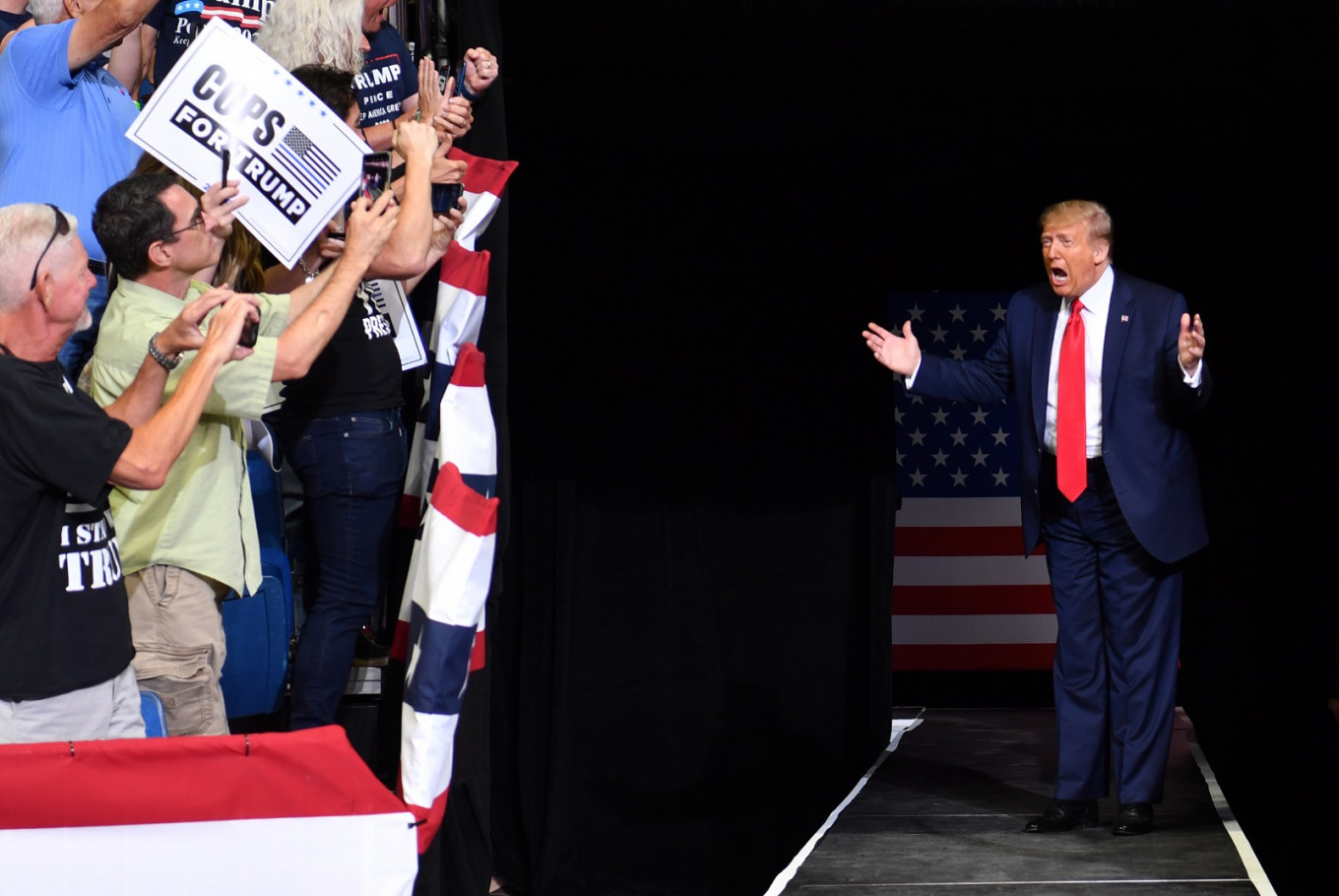Will COVID-19 pandemic oust failing leaders around the world?

US President Donald Trump arrives for a campaign rally at the BOK Center on June 20, 2020 in Tulsa, Oklahoma. (AFP/Nicholas Kamm)
JAKARTA — The pandemic has been a trial for democracies worldwide. In well-running ones, it has been a test of self-restraint as people have been told to stay at home and limit their activities in public in the absence of repressive and confining lockdowns.
It has also been a test for governments to see whether their democratic decision-making – from tiered administration to legislative dynamics – is effective at curbing viral transmission and saving lives, while all the while preventing the economy from collapsing.
Article continues after this advertisementIn South Korea, elections have rewarded the incumbent for his successes. The party of President Moon Jae-in has secured a majority in parliament and has been able to expand its coronavirus response as a result. People signaled their support for the government’s swift actions, which included speedy mass testing, by carrying the President’s party to victory with a historic voter turnout of 66 percent, the highest in 28 years.
But the electoral success of good leadership does not mean that ineffective leaders cannot prevail. In countries under dictators and populist leaders, rulers have made the virus a pretext for spreading fear and repressing citizens.
In Serbia, the party of President Aleksandar Vucic won the country’s recent elections by a landslide amid boycotts from opposition groups. He called for an early election after dissolving parliament and declaring a national state of emergency.
Article continues after this advertisementIn Hungary, Prime Minister Viktor Orban canceled elections as part of the country’s indefinite state of emergency resulting from the pandemic.
For voters in countries facing elections, especially in those with poor COVID-19 responses, the polls should give citizens a chance to show leaders whose policies have caused widespread infection and thousands of deaths at the door.
However, it is not always clear who has failed and who has succeeded in coronavirus measures. Almost all leaders claim their policies are for the good of the people. Besides spreading fear, leaders can choose lax health protocols for the sake of the economy.
Take United States President Donald Trump, for example. While he has been advocating controversial policies – including recommending untested medicine and early reopening in certain states – he may still be reelected in November with the support of those who oppose lockdowns because of the need to earn a living.
He may also benefit from the reluctance of educated and health-conscious voters to go out to vote on Election Day in November.
This is something that voters in every nation should avoid: succumbing to virus fears and letting failed leaders hold on to power and get another lease on political life. The paradox of democracy is that it gives both good and rotten apples an equal chance.
By all means available, either through voting by mail or going to the polls and complying with health protocols, voters must cast their ballots to ensure the best candidate wins.
Indonesian voters should share this mindset. The country will hold concurrent regional elections in 270 provinces, cities and regencies in December. The Jokowi clan is out in force, with the President’s eldest son and his son-in-law seeking to emulate his political trajectory.
The national COVID-19 taskforce has warned that 40 of the regions holding elections in December are considered at high risk for COVID-19 transmission, including Surabaya, where the COVID-19 infection rate was nearing 190 cases for every 100,000 people as of Tuesday.
The General Election Commission (KPU) has devised health protocols requiring voters to wear masks and practice social distancing. But with the notorious logistics problems that regularly accompany elections in Indonesia and the potential for poorly implemented health protocols, observers are predicting a low turnout.
This, however, should not be the case. The pandemic has brought the worst in the first half of this year. Voters and poll organizers should take the elections as a moment for change, for a better future.
This will mean extra work for poll organizers at all levels. They should properly prepare all measures to ensure the safety and health of voters and poll workers. It is also important to consider holding elections in stages and providing mail-in voting to avoid lines at polling stations on Election Day.
Campaign rallies involving crowds may not be necessary. The KPU should encourage candidates to use mass media, such as television, radio, print and social media. The absence of direct contact during campaigns may also give less room for vote-buying, which under typical circumstances is rampant during election time.
Incumbents, despite all the resources at their disposal, will have their destiny decided by voters who will assess their performance in controlling the outbreak. They may all have had past glories and failures, but their response to pandemic may make or break their political careers.
Democracy is hard work, but this is a chance for people to have their voices heard – to determine who is in or out of the government. The coronavirus has created an opportunity to bring major changes to people’s lives. These changes may well begin with the election of the right leaders.
The author Adisti Sukma Sawitri is staff writer at The Jakarta Post.
Disclaimer: The opinions expressed in this article are those of the author and do not reflect the official stance of INQUIRER.net.
For more news about the novel coronavirus click here.
What you need to know about Coronavirus.
For more information on COVID-19, call the DOH Hotline: (02) 86517800 local 1149/1150.
The Inquirer Foundation supports our healthcare frontliners and is still accepting cash donations to be deposited at Banco de Oro (BDO) current account #007960018860 or donate through PayMaya using this link.
















